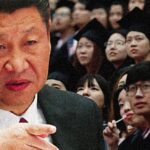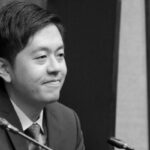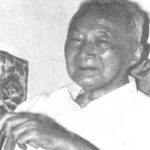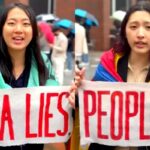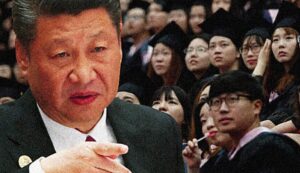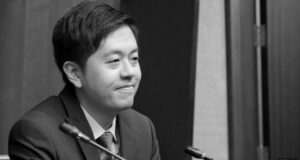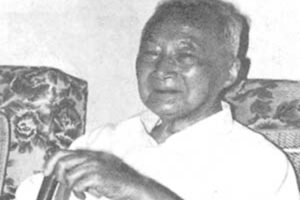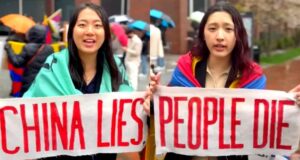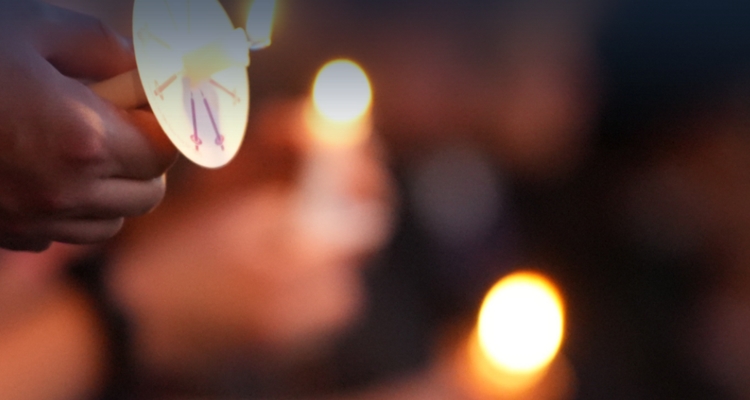
Yang Ruohui, founder of Assembly of Citizens in Canada, was once a pro-CCP “little pink.” Learning about Tiananmen Square was one of the things that helped to change his mind.
Seeking democracy
“What shocked me the most wasn’t that the Chinese Communist Party shot and killed people, because I had long known about the suppression of Tibetans, Uyghurs and Hong Kongers,” he told Radio Free Asia. “What really moved me the most was the freedom and openness of society back in 1989. We all grew up under the dictatorship of Xi Jinping, or at least under the Hu Jintao era [before that], and we had never experienced a mass movement on that scale, and it was for freedom and democracy. Our country and its people were so united in seeking democracy. Even the army, police, judges and the official media, who are now Xi Jinping’s lackeys, stood up to support the students.
“That moment was very moving, and made me feel as if there is actually hope for our country and its people. They may have tried before and failed. But their spirit hasn’t died, so we have to keep on going. One day, we will be able to retake Tiananmen Square.”
Hunger strike
In Hong Kong, which “used to be the only place on Chinese soil—besides Macau” in which people could publicly remember the victims of the Tiananmen Square massacre of June 4, 1989, Chief Executive John Lee recently warned that “any activity on any date” must comply with the law. He would not directly respond to a question about whether it would be okay for Hongkongers to simply gather on the Causeway Bay, i.e., without lighting candles or otherwise indicating commemoration, simply repeating his stress on the exigencies of “national security.” That’s a no. (On June 4, 2024, four people were arrested near the causeway.)
One woman, a former member of the now-defunct Hong Kong Alliance in Support of Patriotic Democratic Movements of China, which used to organize candlelight vigils in memory the victims of Tiananmen Square, has a plan for the day.
“Detained barrister-activist Chow Hang-tung, formerly vice chairperson of the Alliance, said in a social media post on Sunday that she would launch a 36-hour hunger strike in prison to mark the 36th anniversary of the Tiananmen crackdown. Chow, two former Alliance chairpersons, and the Alliance itself stand accused of subversion under the Beijing-imposed national security law. They face life behind bars if convicted.”
Recovering memory
Introducing an interview conducted June 4, 2024 with Xiao Qiang for the China Books podcast, Mary Kay Magistad observed that “China’s Communist Party leaders insist to this day that China’s economic rise couldn’t have happened without the crushing of the 1989 Tiananmen demonstrations.
“Yet the Party has also tried to erase the crackdown from public memory in China, even as many Chinese remember the protests and what they stood for—with some still dedicating their lives to working toward those goals. My guest for this episode, Xiao Qiang, is one such person: a human rights activist and founder and editor-in-chief of China Digital Times (whose digital lexicon we excerpted [“China’s Lexicon of Digital Resistance“]). In this episode, Xiao talks about his life before, during and after the protests, recommends books to better understand the Tiananmen demonstrations, and discusses what the memory of it all still means, both in China and beyond.”
Xiao Qiang says that June 4 is “an unfinished event. In a way, it’s a future event, because it is still an unspoken subject in China.”
Visiting Tiananmen Square
Douglas Lee, a history professor, has published an account of what he observed during a visit to Beijing in 1989.
On June 3, 1989, “I felt compelled to go to the square that evening… It was still daylight when we arrived. There were so many people there, all acting very casually and seemingly happy…. I spoke to several people, asking how they were doing and whether they were fearful that something might happen to them. Most were confident they would be fine.
“We returned to our hotel around 10:30 p.m…. Later that night, I was awakened by frantic knocking on my door. A member of our group informed me that government troops were killing people in the square….
“I was eventually able to find CNN news, out of the USA, which reported about the events unfolding a few miles from my hotel. It was only then that I began to understand the extent of the violence….
“The following morning, our tour group left the hotel at 7 a.m. for the Beijing Railroad Station bound for the seaport (Qinhuangdao), where our cruise ship was docked. The bus to the train station took a zig-zag route, often down narrow lanes, where people stood on corners with the ‘V’ sign for victory.
“We were detained at one major intersection, where tanks were parked on an overpass. When we finally got to the train station, it was, as it had been when we arrived the day before, deserted and locked up. We were the only people allowed into the station…. In a few hours, we were rumbling through the countryside on a sunny morning, as if nothing had happened. The events of June 4-5, 1989, in Beijing seemed like a dream, rather a nightmare, that was rapidly vanishing.”
Courage
At a hearing conducted June 4, 2024 by the Congressional-Executive Commission on China, several Chinese activists testified, including Zhou Fengsuo, a student leader at Tiananmen in 1989.
“I was among the first to protest on Tiananmen Square when Hu Yaobang died, and I was among the last to leave when the tanks were rolling in, one only twenty feet from me. In between, I witnessed the most incredible outpouring of Chinese people in support of freedom and democracy….
“I also witnessed the brutal massacre of these peaceful protestors by elite troops, armed with tanks and machine guns…. The scene was that of a war zone; a war conducted by the CCP’s army against the Chinese people. I remember Zhong Qing, my younger schoolmate from Tsinghua, who died for our shared dream of a better China. He was only a third-year student, studying in the instrument department at Tsinghua University. When I realized he was dead, I couldn’t believe what I was seeing. I realized I must carry on in his name, and continue speaking out on his behalf.
“The military’s brutal siege of the city encountered courageous resistance from the people of Beijing. When martial law was first declared, millions of people came out to block the troops. Many of them stood still in front of the marching soldiers and rolling tanks in order to protect the student protestors like me. That is how we witnessed the great Tank Man, who has since become one of the most important icons of the last century, representing courage against overwhelming power and violence…..
“Perhaps the CCP once could have taken a different path, transforming into a social democratic party, but the massacre and crackdown in 1989 eliminated the ability of this regime to be positively changed through mere trade and investment. United States policymakers have deliberately put their heads in the sand, ignoring the cause of human rights activists and political prisoners in China. This strategy may have brought short term gains in the form of increased profit, but appeasing the CCP for the benefit of trade has proven to be self-defeating and self-destructive.
“What Tiananmen told us 35 years ago, the most important lesson, is that the United States policy towards the CCP regime must focus on the democratization of China. Without democratization, the regime will become an even stronger threat towards universal values, including freedom and human rights.”
Also see:
Congressional-Executive Commission on China: “Tiananmen at 35: The Ongoing Struggle for Human Rights and Democracy in China”
StoptheCCP.org: “On Courage: Our Ultimate Weapon Against the Chinese Communist Party”
